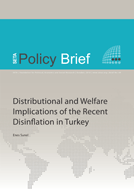Turkey is among emerging economies that have experienced sharp declines (in the form of structural changes) in the level of inflation rate since the mid-1990s. Motivated by the availability of better data on financial system characteristics and distributional measures, this brief explores the distributional and welfare impacts of the recent reduction in inflation on the Turkish economy. In particular, the extent of financial dollarization and the inequality in the distribution of demand and term deposits are documented. This brief points out that apart from the classical adverse effects of inflation such as price distortions and wealth eroding; redistributive effects of inflation might be created by the particular way that the fiscal policy responds to the monetary policy.
Emerging economies that have a record of high inflation rates have been experiencing disinflation since the mid-1990s. The goal of this brief is to shed light on potential policy measures in regards to the distributional and welfare consequences of this recent disinflation in emerging economies. These policy measures arise as the outcome of an effort to reconcile the disinflation phenomenon with the characteristics of the financial system of an emerging economy.
Empirical literature on the household portfolio heterogeneity convey that (i) the likelihood of holding interest-bearing assets increases with income and wealth. (ii) Poor individuals tend to use cash for a larger portion of their total transactions than the rich. (iii) The poor are more likely to consider inflation as a top national issue. These findings lead to the classical idea that inflation acts as a regressive consumption tax for the poor.
The focus of this brief on adverse effects of inflation is confined to: (i) wealth eroding effect and (ii) asymmetric taxation of consumption that manifests itself as an increase in the real transactions costs incurred (due to lower demand for real balances). This approach obviously rules out the redistributive role of inflation among parties of nominal debt contracts that is, surprise inflation being desirable for debtors at the expense of creditors due to deflation of the nominal debt. However, financial dollarization feature of emerging economies dampen this channel. As it is exemplified by findings of the related empirical literature in Section 3, an important fraction of financial assets in emerging economies are denominated in foreign currency. In a financially dollarized small open economy, the real return of foreign currency denominated deposits is ultimately determined by exogenous factors, that is, the world interest rate. Therefore, a higher degree of financial dollarization would cause the real return of interest-bearing assets to be less responsive to the domestic inflation rate and therefore mute the redistribution among nominal contract holders.
Given the described characteristics of the financial system in emerging economies, the monetary and fiscal interactions (i.e. how the seigniorage revenues will be used in the consolidated government budget) become essential. Such interactions govern the redistribution scheme linked to inflation taxation, which could potentially have strong wealth effects. There is already a strong view in the literature that inflation and fiscal deficits are positively correlated. Yet, one has to go deeper in analyzing the components of the fiscal deficit. To this end, if inflation tax revenues are used to finance aggregate transfers to households, then somewhat surprisingly, disinflation could be welfare “reducing”. This unusual implication of disinflation could emerge because of the fact t










